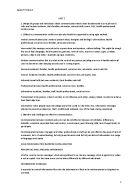Diploma in health and social care essay on communication.
Agata Protaziuk
UNIT 1
.1Range of groups and individuals whose communication needs must be addressed in own job role is wide and include residents, their families, advocates, internal staff, carers, CQC, health professionals, social services.
.2Effective communication within own job role should be supported by using right method.
Verbal communication(uses words to present ideas, thoughts and feelings)-with resident, health professionals, social services, families, advocates and CQC.
Non-verbal (the message we send out to express ideas and opinions, without talking. This might be trough the use of body language, facial expression, gestures, tone of voice, touch or contact, signs, symbols, pictures, objects and other visual aids.eg signs-residents).
Written communication-this is central to the work of any person providing a service in health and social care environment when keeping records and in writing reports.
Personal-residents, families, health professionals, social services, advocates, carers and CQC.
Formal- residents, families, health professionals, social services, advocates, CQC.
Informal(casual talk)-between residents, their families and staff.
Professional-between health professionals, social services, families.
Informative-residents, families, staff, health professionals, social services.
Promotional-is the process where two sides try to influence each other, using symbols, in order to achieve their final objectives.
Informative-when people share knowledge about the world in which they live. Informative messages attempt to present an objective- that’s truthful and unbiased-view of the topics being considered.
.3Barriers and challenges to effective communication.
Communication between resident and carer can be not effective because of: attitudes, differences, disability, emotions (especially fear and anxiety), environment, poor listening skills, lack of opportunity to participate.
Communication between manager and other professionals or staff can be not effective because of: lack of awareness, lack of understanding, lack of group discussion and lack of provision of information in a range of languages and media.
MAIN COMMUNICATION BARRIERS IN ORGANIZATION
PERCEPTUAL AND LANGUAGE DIFFERENCES
All of us want to receive messages which are significant to us. But any message which is against our values is not accepted. Also the same event can be taken differently by different individuals.
INFORMATION OVERLOAD
Is essential to control information flow else the information is likely to be misinterpreted or forgotten or overload.
INATTENTION
All times we only hear, not just listen. Repetitive messages should be ignored for effective communication.
UNIT 1
.1Range of groups and individuals whose communication needs must be addressed in own job role is wide and include residents, their families, advocates, internal staff, carers, CQC, health professionals, social services.
.2Effective communication within own job role should be supported by using right method.
Verbal communication(uses words to present ideas, thoughts and feelings)-with resident, health professionals, social services, families, advocates and CQC.
Non-verbal (the message we send out to express ideas and opinions, without talking. This might be trough the use of body language, facial expression, gestures, tone of voice, touch or contact, signs, symbols, pictures, objects and other visual aids.eg signs-residents).
Written communication-this is central to the work of any person providing a service in health and social care environment when keeping records and in writing reports.
Personal-residents, families, health professionals, social services, advocates, carers and CQC.
Formal- residents, families, health professionals, social services, advocates, CQC.
Informal(casual talk)-between residents, their families and staff.
Professional-between health professionals, social services, families.
Informative-residents, families, staff, health professionals, social services.
Promotional-is the process where two sides try to influence each other, using symbols, in order to achieve their final objectives.
Informative-when people share knowledge about the world in which they live. Informative messages attempt to present an objective- that’s truthful and unbiased-view of the topics being considered.
.3Barriers and challenges to effective communication.
Communication between resident and carer can be not effective because of: attitudes, differences, disability, emotions (especially fear and anxiety), environment, poor listening skills, lack of opportunity to participate.
Communication between manager and other professionals or staff can be not effective because of: lack of awareness, lack of understanding, lack of group discussion and lack of provision of information in a range of languages and media.
MAIN COMMUNICATION BARRIERS IN ORGANIZATION
PERCEPTUAL AND LANGUAGE DIFFERENCES
All of us want to receive messages which are significant to us. But any message which is against our values is not accepted. Also the same event can be taken differently by different individuals.
INFORMATION OVERLOAD
Is essential to control information flow else the information is likely to be misinterpreted or forgotten or overload.
INATTENTION
All times we only hear, not just listen. Repetitive messages should be ignored for effective communication.









